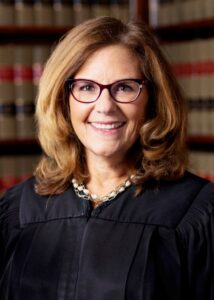Meet Hon. Brenda Freedman: Bringing Restorative Practices to Juvenile Justice

Hon. Brenda Freedman
“Youth have so much to offer, but often don’t get the opportunity to explore their skills and strengths because they get stymied by the negative influences around them. If we can just provide them the nets necessary to provide the safety and the exposure and opportunities, they will thrive,” said Hon. Brenda M. Freedman, a New York State, Erie County Family Court Judge.
Judge Freedman is the Youth Part Judge for Erie County (part of adult, superior court designated for 16- and 17-year-olds charged with felonies and Juvenile Offenders) and is primarily focused on juvenile justice.
This led to a natural involvement with the Racial Equity Roundtable’s Juvenile Justice Works (JJW), a coalition of more than 35 partners that focuses on reducing contact with and improving outcomes resulting from juvenile justice systems to advance equitable outcomes for young people.
“The most important part of Juvenile Justice Works is having collaborative partners across sectors in the community all working toward a common goal,” said Judge Freedman. “The partners are really committed to the goal of reducing crime and supporting youth, and it is rewarding to work with people who are not doing it because they have to, but because they’re passionate about it.”
Judge Freedman’s career path was part winding and part in her DNA.
“My mom was a big ‘who’s who’ for female lawyers, the first woman president of both the local bar and the state bar, and broke a lot of glass ceilings for women in a variety of contexts. And my dad was a well-known criminal defense lawyer,” Judge Freedman explained. “I did not necessarily want to go to law school, and I took time off after undergrad to figure out what I wanted to do. I didn’t have a good plan so I went to law school anyway, and it turned out I loved it.”
From there, she practiced at both large and small firms, eventually going into practice with her mom to create the first mother-daughter practice in the state, then taking her career in a different direction, to education and the non-profit space, before returning to her roots in law. She became a court attorney referee for 15 years before running for Family Court Judge a decade ago.
Tapping into her experience as a teacher, Judge Freedman advocated for bringing restorative practices into juvenile justice, the first of its kind in the state that has since been replicated in many other counties, which is reducing the recidivism rate for Western New York youth. One of the strategies she is partnering with the Erie County Restorative Justice Coalition on, through JJW, is a three-part series focused on car theft. The program includes:
- Taking a deep dive into the needs of the youth by leveraging community partnerships in the areas of mental health, substance abuse, education, mentoring programs and pro-social activities to support youth in being law abiding in the community.
- A circle with victims so that the youth understand the consequences of their actions and build empathy for the problems they have caused. For example, a youth who stole a car might just think they took that car for a joy ride, when it affects the victim much more deeply.
- A role play exercise with law enforcement to help them better understand the risks that law enforcement officers are taking every day, which leads to developing trust and stronger relationships.
Additionally, Judge Freedman serves as Chair of the Erie County Juvenile Justice Coalition and has initiated and led many innovative and collaborative practices to create better outcomes for justice-involved youth, including a well-received celebration of youth who have overcome their justice involvement and are on paths to successful and law-abiding futures.
Judge Freedman has also created programs to divert youth from court involvement and led an Anti-Bullying Task Force with the Buffalo Public Schools which resulted in specific recommendations to the Board that are currently being implemented in the school district.
“A lot of our youth are stuck in a level of survival, making fight or flight decisions every day,” said Judge Freedman. “I hope that ultimately, through the JJW and all of us working collaboratively together, we can provide the infrastructure that allows them to succeed.”
To learn more about Juvenile Justice Works, click here.